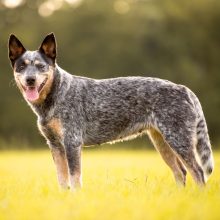Australian Cattle Dog
Lifestyle Needs

The Australian Cattle Dog, as his name suggests, is a working dog. He has great stamina and endurance, is protective of his property and wary of strangers. He needs exercise and training to make use of his talents and energies and a firm, energetic owner. He needs to live in a house with a garden and have plenty of opportunity to run free. His coat is short and requires grooming once a week. He is not an ideal family pet.
Genetic Diversity
(Known as Coefficient of Inbreeding: 'COI'. It should be as low as possible.)
The UK Kennel Club breed average COI is 3.9% - See 'A Beginners Guide to COI'
Gene Pool Size
(Known as Effective Population Size: 'EPS')
134
EPS is a measure of how many individuals are contributing genetically to a breed population. It is a measure of the size of the gene pool in a breed. Lower than 100 is considered critical by conservationists and below 50 brings a breed close to extinction. For more information see the Kennel Club article.
Health and Welfare Problems due to Conformation
(Body shape and physical characteristics)
None known
BVA/KC Health Schemes: www.bva.co.uk/chs
- Hip dysplasia breed 5 year mean score 12 (ideally parents should be lower)
- Elbow dysplasia: score ideally 0:0
- Eye disease: Progressive retinal atrophy (PRA) (annual screening); Primary lens luxation (PLL) (annual screening)
- BAER testing (for deafness)
Estimated Breeding Values (EBVs) : No EBVs are currently available for this breed
www.thekennelclub.org.uk/about-ebvs
DNA Tests Available
DogWellNet and IPFD Harmonisation of Genetic Testing for Dogs (HGTD)
www.dogwellnet.com/breeds
- Progressive retinal atrophy (PRA prcd)
- PRA rcd4
- Neuronal Ceroid Lipofuscinosis 5
- Multi drug resistance (MDR1)
- Primary lens luxation (PLL)
- Cystinuria
- Myotonia Congenital
- Leukoencephalomyelopathy
Availability of a DNA test does not mean that it is always necessary or even desirable for breeders to use this test.
Other Breed-Specific Health Screening Schemes
- BAER testing (pigment associated deafness).
Ask the breeder to show you the certificates for the above tests/screening for both parents. If any of the above tests have not been considered necessary by the breeder (and there may be good reasons), ask her to explain why.
Other Diseases Reported
(For which there are currently no genetic or screening tests for sire or dam)
- Portosystemic shunt
- Patellar luxation
- Cataract
- Glaucoma
- Urolithiasis
- Polioencephalomyelopathy
- Cancer: mast cell tumour; Lymphoma
Ask the breeder about the medical history of the parents, grandparents and great grandparents. Consider carefully whether to purchase a puppy if some of these or other diseases are in the family line.
Ask about the breeder’s policy in cases of serious genetic diseases occurring to your puppy in later life. Good breeders will request to be informed of such events in order to improve future breeding decisions.
You are strongly advised to buy from a breeder who uses (or is prepared to use) the AWF Puppy Contract and Puppy Information Pack (PIP): www.puppycontract.org.uk
The breeder should also be familiar with the CFSG/DBRG Code of Practice for Dog Breeding